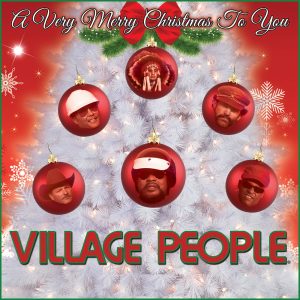IMPACTING RADIO NOW
A holiday tradition continued in Tinseltown this past Sunday as the 86th annual Hollywood Christmas Parade made its way through the heart of the tourist district, with television personality Dr. Oz serving as grand marshal.
The parade featured a 40th anniversary performance by The Village People which coincides with the release of their new Christmas single “A Very Merry Christmas To You”. “A Very Merry Christmas To You” began impacting radio nationally this week which landed them on the Most Added Chart at New Music Weekly magazine.

Visit The Village People online at officialvillagepeople.com Consumers can purchase music online from any of hundreds of digital retailers including, iTunes and Amazon.
New single is available on Spins Tracking System www.spinstrackingsystem.com and AirplayAccess at www.airplayaccess.com to radio programmers worldwide.
For interview request, additional information or for radio station visits, please contact Loggins Promotion at 310-325-2800 or email staff@logginspromotion.com .
The 86th Annual Hollywood Christmas Parade was taped for network television and the live event will premiere as a two-hour special on The CW on Friday, December 15 at 8:00 p.m. ET / PT (7:00 p.m. CT). 
ABOUT THE VILLAGE PEOPLE:
When Village People burst on the scene in the 1970s, “they” became an overnight sensation. Actually, “they” were Victor Willis. Village People were a concept -the “group” was Victor Willis with use of session background singers. Whenever you hear the unmistakable voice of Victor Willis, you know you’ll be dancing… and smiling. And there’s no escaping it. With record sales exceeding 100 million worldwide, you cannot turn on a radio without hearing him. He’s a crowd pleaser whose distinctive voice is heard at every wedding, party, and at every type of sports.
HOW IT ALL STARTED
In 1976 Horace Ott was the arranger for an album Victor was recording for an independent record label. Ott was also the arranger for French producer Jacques Morali who was producing “The Ritchie Family.” Ott introduced Victor to Morali who immediately asked Victor to sing background on his Ritchie Family project. After hearing Victor’s voice, Morali asked him to record lead vocals for a concept album he was mulling over. Morali told Victor he’d had a dream that one day he’d be the lead singer of a new group he wanted to create that would make him a star. Victor agreed and recorded an album called Village People. The album quickly shot to the top with songs like “San Francisco,” and “In Hollywood (Everybody’s A Star).” At this time Victor was performing in the original Broadway production of “The Wiz.” After one evening’s performance Morali rushed back stage with Billboard music chart in hand shouting, “Darling, darling, we’re number one! You’ve got to quit The Wiz! Come now!” The songs were becoming so popular that people wanted to see Village People live; there was even a personal invite from Dick Clark for them to appear on American Bandstand.
FORMATION OF THE GROUP
Actors and dancers were quickly assembled by Victor and Morali to form Village People “the performance group,” But Village People “the recording group” remained just Victor. After a few shows, Victor and Morali recast the group and held open auditions for these new members. They kept the Indian and the GI, while hundreds of applicants showed up vying for the positions of “construction worker,” “leatherman” (not biker) and “cowboy.” Victor eventually took on the role of “policeman.” And this cast of characters took the world by storm.
HEIGHT OF SUCCESS
Morali, already impressed with Victors’ writing ability and soulful sounds first heard on his 1976 demo album, invited Willis to consider being his writing partner for all the songs (Willis lyrics, Morali music) for the second Village People album, Macho Man, which quickly sold over a million copies and eventually earned double platinum status. While writing hits for Village People, the writing team of Willis-Morali was hot property, churning out two hit albums for Patrick Juvet, as well as, material for The Richie Family, and Phylicia Ayers-Allen [Rashad], Victor’s former wife. The next Village People album was Cruisin. It featured the blockbuster Willis-Morali hit “Y.M.C.A.” which was a worldwide smash. It even inspired its own “Y.M.C.A dance.” To this day, this iconic song and other music by Victor Willis can be heard in movies like Despicable Me 2, television shows and commercials for companies including a Pepsi Superbowl ad, Taco Bell, and Wonderful Pistachios. “Y.M.C.A.” is one of the biggest selling songs of all time at 18 million copies – not counting digital downloads. It was also recognized by BMI for attaining over 1 million airplays in America. Go West was the fourth Village People album, and Victor’s final hit album with the group (with the exception of the release of Village People Live which went gold). Victor’s departure spelled the end of gold and platinum records for Village People. Go West features the smash hits “In the Navy,” and “Go West, which went on to become a major hit for the Pet Shop Boys. Victor’s lyrics have become the group’s anthem and most popular song. “Go West” was also featured in the hit Broadway musical Priscilla Queen of the Desert.
BEFORE VILLAGE PEOPLE
Prior to Village People, Victor was an aspiring solo artist, recording his own songs and national commercial jingles for companies like Lincoln-Mercury. Victor was also an actor. His first involvement in a major musical was as part of the cast in the Las Vegas production of “Hair.” He went on be cast in three Tony Award-winning plays: Two Gentlemen of Verona, The River Niger, and The Wiz. Victor’s regular role in the Broadway production of The Wiz was Uncle Henry. However, he performed as the Tin Man and Lion frequently as he understudied both roles. Prior to his stint in the original Broadway production of The Wiz, Victor starred as “The Tin Man” in the Australian production. He also appeared in the Obie Award-winning dramatic musical The Great MacDaddy.
VICTOR WILLIS TODAY
In a well-publicized and precedent setting legal case, Victor recaptured the copyrights to his Village People music catalog and once again controls the rights to his music. His long-awaited solo album, Solo Man, is finally available. He garnered a star on the Hollywood Walk of Fame. Most importantly -Victor Willis is back — once again performing the songs that mean so much to his fans — the songs that have become part of our lives. When you hear his powerful and distinctive voice singing San Francisco, In Hollywood, Macho Man, In the Navy, Go West, and Y.M.C.A., you’re transported back to a time when life was a little less frantic and a lot more fun.
ABOUT HOLLYWOOD CHRISTMAS PARADE:
The Hollywood Christmas Parade (formerly the Hollywood Santa Parade or Santa Claus Lane Parade) is an annual parade that takes place on the Sunday after Thanksgiving in the Hollywood community in Los Angeles, California, United States. The parade follows a 3.5-mile (5.6 km) route along Hollywood Boulevard, then back along Sunset Boulevard and features various celebrities among its participants. Per tradition, Santa Claus appears at the conclusion of every parade.
Beginning in 1928, Hollywood merchants transformed a one-mile stretch of Hollywood Boulevard into “Santa Claus Lane” to boost shopping. Part of the promotion was a daily parade featuring Santa Claus and a film star.[1] Originally called the Santa Claus Lane Parade, the inaugural event featured only Santa Claus and the actress Jeanette Loff. The parade continued to grow in scale with the help of local businesses and the community. In 1931 Santa Claus rode a truck-pulled float instead of the reindeer-pulled carriage of previous years. American Legion Post 43 marched with a color guard, drum line and bugle corps.
The Parade was suspended from 1942 to 1944 due to World War II, but reopened in 1945 with record attendance. In 1946 Gene Autry rode his horse in the parade and was inspired by the children yelling “Here comes Santa Claus, Here comes Santa Claus,” to write the song “Here Comes Santa Claus” along with Oakley Haldeman. Autry would become a perennial Grand Marshal of the parade.
The parade continued to grow throughout the 1950s, ’60s, and ’70s, adding floats, animals, bands and celebrities. By 1978, the parade had been renamed the Hollywood Christmas Parade in order to attract more celebrities, and was broadcast locally on KTLA-TV with the help of Autry and Johnny Grant. This change coincided with a shift in the parade’s scheduling from Thanksgiving Eve to the Sunday after Thanksgiving.
In 2002, an attempt to present the parade as a primetime special on NBC proved disastrous. Executive produced by Bob Bain, the hour-long “Blockbuster Hollywood Christmas Spectacular” aired on December 1 on NBC, but ratings were a flop despite the spectacular 170′ highfall by stuntman, Mikal Kartvedt, to close out the nationally televised event. The following year, the Hollywood Chamber of Commerce announced it would discontinue airing the parade on KTLA and other Tribune Broadcasting stations due to rising production costs.
In March 2007, the Hollywood Chamber of Commerce decided to end the parade’s run due to lack of celebrities and a loss of $100,000 for the 2006 production, which The Associated Press said cost about $1 million to mount. However, later in 2007, the City of Los Angeles created a new parade to replace the Hollywood Christmas Parade, entitled the Hollywood Santa Parade and produced on the weekend after Thanksgiving (the original parade had traditionally been held on the Wednesday evening before the holiday). Participation in the new parade became by invitation only, and Bob Barker, fresh from his farewell tapings as host of The Price Is Right, was that year’s Parade Grand Marshal. 2007 and 2008, KTLA had aired the new parade on a tape-delayed basis. It was later announced that MyNetworkTV would telecast the 2009 parade (with the Hollywood Christmas Parade name restored) in two consecutive prime-time showings: the first scheduled for December 10, the second for Christmas Eve night. The parade was then produced by Associated Television International with the 2010 and 2011 parades also being produced by ATI. The parade then aired on The Hallmark Channel, and then later aired in syndication throughout the United States. On 2015, the parade returned to The CW and once again on KTLA as a national event, albeit pre-taped as in past years. Lifestyle became the parade’s 1st international broadcaster outside the US, airing for cable viewers in the Philippines given LA’s huge Filipino-American presence.
The 2017 parade will once again be televised on The CW in the US (through KTLA), and for the Philippines on Lifestyle for the 3rd straight year.
Radio contact:
Loggins Promotion
Tel: 310-325-2800
Email: staff@logginspromotion.com

